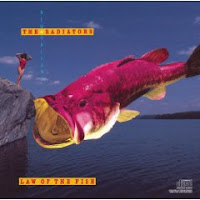
Album: The Rainmakers, The Good News and the Bad News, 1989
Best Track: "Reckoning Day"
Lasting Memory: Several times each week, I find myself quoting anywhere from a line from to the complete lyrics of a song off of the Rainmakers' The Good News and the Bad News. Lead vocalist and songwriter Bob Walkenhorst did some genius work on the album, and I was pleased to discover today that he hasn't lost his fastball over the past two decades.
He certainly wasted no time in giving Good News listeners the good stuff, kicking off the record with "Reckoning Day":
Well I was thinking about Abraham Lincoln
And the enemies of the truth
But I could not tell a Kennedy
From a John Wilkes Booth
Now outta my way
Outta my way
Outta my way
Hot rocking on reckoning day
And I feel like picking a fight
With anybody who claims they’re right
All the preacher men the politicians
The critics and the things they write
Outta my way
Outta my way
Outta my way
Hot rocking on reckoning day
And this is a call to arms
This is a call to hands
This is a call to the voices and the minds
Of the people in every land
Outta my way
Outta my way
Outta my way
Hot rocking on reckoning day
We’re taking the history test
Who’s baddest and who is best
(a) Lennon the brother
(b) Lennon the sisters
(c) Lenin the communist
Outta my way
Outta my way
Outta my way
Hot rocking on reckoning day
Reckoning day put the money in the mattress
Reckoning day put your pennies where they count
Reckoning day nothing left to believe in
Nothing to doubt nothing left to wait for
And getting him to tell the truth
Was like pulling a wisdom tooth
And though he never would admit it
Everybody knew he did it
When he burned down the voting booth
Outta my way
Outta my way
And we are the immigrant flock
Shipwrecked on Plymouth Rock
From the Monitor the Merrimack
From the Thresher and the Pueblo and the Titanic
Reckoning day put the money in the mattress
Reckoning day put your pennies where they count
Reckoning day nothing left to believe in
Nothing to doubt nothing left to wait for
How could that cavalcade of historical revisionism, rhetorical riddles, and aphorisms fail to recur to me during the past month?

I experienced the same pleasant haunting from "Shiny Shiny" whenever I've had reason to think about my father's rusting but redoubtable 1965 Mustang. The lines "She's the one he never sold/ Some things are classic, some are just old" whispered in my mind's ear nearly every day until my old man finally did sell the car in the winter of 2007.
No doubt the many lyrics' staying power was enhanced by the fact that they were played and sung in a manner that suggested Steve Forbert was fronting a supergroup made up of members of the dB's and the Hooters. [ED: If you do nothing else today, click on the Steve Forbert link. It will make your day. I always feel good for hours after hearing "Romeo's Tune." You will, too.]
The effect is strong and welcome. "We Walk the Levee" is the soundtrack to my thoughts about Hurricane Katrina. "Spend It on Love," which opens with
Hear tell of a man who took a hundred dollars
Spent it on lottery tickets and beer
Won a couple million, left his wife and children
Lived himself for dead in a couple of years
Should have spent it on love
Spent it on the children
Spent it on the ones who need it the most
runs through my head every time I'm down at the Breez Inn buying lottery tickets and beer. Duh.
Then there's "Thirty Days." As Walkenhorst helpfully reminds listeners and rememberers, "Thirty days has September/ April June and county jails." That's a lesson best not forgotten, as is the song's later description of a God who, rather than resting after six hard days of creating "got drunk and lonely/ Created trouble and time alone" -- a God who "Each thirty days he shoots out the full moon/ Just to remind us we're on our own."
Try not to keep that in mind the next time you're enjoying an eye-opener on Sunday morning instead of sitting in a church pew.
Up Next: Ramones, Ramones, 1976 (cassette reissue)








